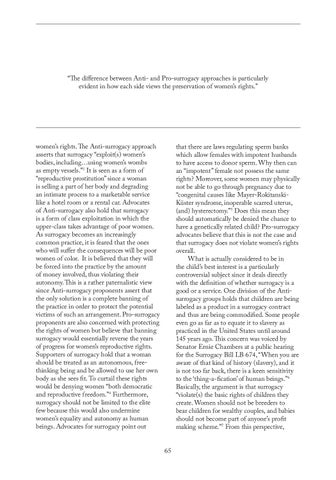“The difference between Anti- and Pro-surrogacy approaches is particularly evident in how each side views the preservation of women’s rights.”
women’s rights. The Anti-surrogacy approach asserts that surrogacy “exploit(s) women’s bodies, including…using women’s wombs as empty vessels.”3 It is seen as a form of “reproductive prostitution” since a woman is selling a part of her body and degrading an intimate process to a marketable service like a hotel room or a rental car. Advocates of Anti-surrogacy also hold that surrogacy is a form of class exploitation in which the upper-class takes advantage of poor women. As surrogacy becomes an increasingly common practice, it is feared that the ones who will suffer the consequences will be poor women of color. It is believed that they will be forced into the practice by the amount of money involved, thus violating their autonomy. This is a rather paternalistic view since Anti-surrogacy proponents assert that the only solution is a complete banning of the practice in order to protect the potential victims of such an arrangement. Pro-surrogacy proponents are also concerned with protecting the rights of women but believe that banning surrogacy would essentially reverse the years of progress for women’s reproductive rights. Supporters of surrogacy hold that a woman should be treated as an autonomous, freethinking being and be allowed to use her own body as she sees fit. To curtail these rights would be denying women “both democratic and reproductive freedom.”4 Furthermore, surrogacy should not be limited to the elite few because this would also undermine women’s equality and autonomy as human beings. Advocates for surrogacy point out
that there are laws regulating sperm banks which allow females with impotent husbands to have access to donor sperm. Why then can an “impotent” female not possess the same rights? Moreover, some women may physically not be able to go through pregnancy due to “congenital causes like Mayer-RokitanskiKüster syndrome, inoperable scarred uterus, (and) hysterectomy.”5 Does this mean they should automatically be denied the chance to have a genetically related child? Pro-surrogacy advocates believe that this is not the case and that surrogacy does not violate women’s rights overall. What is actually considered to be in the child’s best interest is a particularly controversial subject since it deals directly with the definition of whether surrogacy is a good or a service. One division of the Antisurrogacy groups holds that children are being labeled as a product in a surrogacy contract and thus are being commodified. Some people even go as far as to equate it to slavery as practiced in the United States until around 145 years ago. This concern was voiced by Senator Ernie Chambers at a public hearing for the Surrogacy Bill LB 674, “When you are aware of that kind of history (slavery), and it is not too far back, there is a keen sensitivity to the ‘thing-a-fication’ of human beings.”6 Basically, the argument is that surrogacy “violate(s) the basic rights of children they create. Women should not be breeders to bear children for wealthy couples, and babies should not become part of anyone’s profit making scheme.”7 From this perspective, 65
